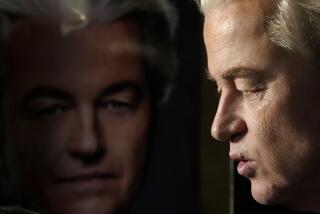His Party Turns Its Back on Botha : Endorses De Klerk’s Bid to Be President of South Africa
- Share via
JOHANNESBURG, South Africa — The top echelon of the ruling white National Party on Monday delivered an unprecedented formal rebuke to President Pieter W. Botha, its tough-fisted chief for the past decade, by unanimously endorsing new party leader Frederik W. de Klerk’s bid to become South Africa’s president.
The party’s executive council and its parliamentary caucus, meeting late into the night in Cape Town, turned its back on Botha a day after the 73-year-old president defiantly declared that he had fully recovered from a stroke and would return to his post for at least another year.
Although the party’s decision does not prevent Botha from remaining as president and resuming his duties, it creates an untenable situation for him since he must have the party’s support to make policy and get his programs approved in Parliament.
De Klerk telephoned Botha at the president’s coastal vacation home to tell him the results of the vote, a party spokesman said. The president and the party leaders will likely meet to discuss the matter today or Wednesday, after he returns to his office in Cape Town for the parliamentary debate on next year’s budget, a party spokesman said.
Could Extend Term
Botha and the party could then reach a compromise about his future that would, for example, allow him to serve a few months and then retire. His second five-year term expires in September, but theoretically he has the option of extending it until March, 1990, by which time Parliament must be dissolved and a new general election called. Many party leaders had hoped for an earlier election to consolidate National Party support under a new leader.
It was the president himself who inadvertently triggered the crisis in his party, which created the system of apartheid and which has led the white minority government in this country for the past 40 years.
Two weeks after suffering a mild stroke on Jan. 18, Botha relinquished his post as party leader, and the National Party caucus elected De Klerk, the 52-year-old education minister, to replace him.
Under South Africa’s system of government, which denies the black majority a vote in national elections, the ruling party’s decision effectively tapped De Klerk as the next president. In his first days as party leader, De Klerk impressed a broad spectrum of white South Africans with what was seen as a more aggressive approach to apartheid reform than the step-by-step program launched by Botha.
When Botha, without consulting party leaders, announced in a nationally televised interview Sunday night that he would return to office, many party members were angry. They considered the TV appearance an attempt to bypass the party hierarchy, and De Klerk called a meeting of the party’s chief policy-making body for Monday.
Confidence Motion
The resolution adopted by the policy-makers and, later, by the caucus of party members in Parliament, declared that it was “in the best interest of the country and the National Party that the national leader of the party should fill the office of state president.” Then, a motion of full confidence in De Klerk as leader of the party also was passed unanimously.
For Botha, an aloof, imperious man who commanded total loyalty during his years in power, the party’s action indicated just how sharply his support had dwindled during his eight weeks’ convalescence. As the longest-serving member of Parliament, marking his 41st year in the body, Botha had come to dominate his party. He had been known to scold members of his Cabinet in public for disagreeing with him, and his temper was legendary.
Although party leaders had quietly expressed their hope that Botha would step aside for the younger, more flexible De Klerk, few party regulars had dared go public with their desires on the chance that Botha would return and, as he has so many times in the past, take revenge by destroying them politically.
In the interview with state-run television Sunday night, his first public appearance since his stroke, Botha denied that he was “an old man clinging to power,” as government-supporting newspapers had begun to characterize him.
He said he had split the jobs of president and party leader to devote more time to his duties of head of state. And he dismissed newspaper reports that the party wanted him to retire, suggesting that those stories were the work of forces trying to “sow political confusion” in the country.
More to Read
Sign up for Essential California
The most important California stories and recommendations in your inbox every morning.
You may occasionally receive promotional content from the Los Angeles Times.














